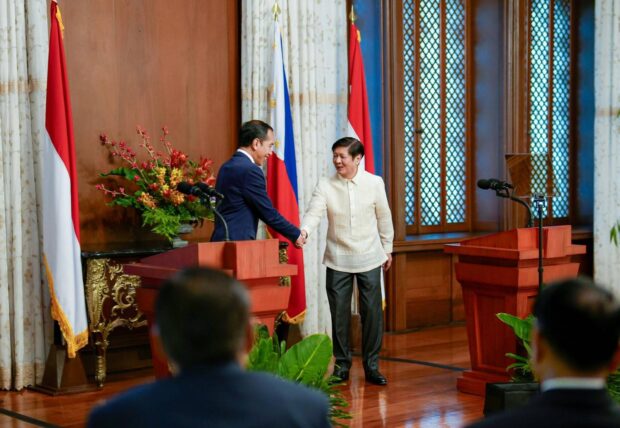
President Ferdinand Marcos Jr. and Indonesian President Joko Widodo.
MANILA, Philippines — The Department of Energy (DOE) on Wednesday welcomed the signing of a memorandum of understanding (MOU) between the Philippines and Indonesia on cooperation in the energy sector, as it would help improve collaboration between the two countries, especially during periods of supply constraints.
In a statement, the DOE said the memorandum offered benefits across economic, environmental and geopolitical dimensions through collaboration on energy transition.
“The signing of the MOU reinforces and updates the long-term energy cooperation between the two countries,” Energy Secretary Raphael Lotilla said. “On the part of the Philippines, it is an offshoot of [President Ferdinand Marcos Jr.’s] efforts to achieve higher energy security through energy diplomacy.”
Indonesian President Joko Widodo arrived in Manila on Tuesday night for a three-day official visit.
According to the DOE, both countries agreed to facilitate cooperation between their respective business sectors, particularly when coal and liquefied natural gas (LNG) supplies fall short.
Ninety-eight percent of the Philippines’ imported coal in 2022 came from Indonesia, the agency previously said.
Jakarta also committed to provide an “uninterrupted supply” of coal exports for Manila during the DOE’s meeting with other members of the Brunei Darussalam-Indonesia-Malaysia-Philippines East Asean Growth Area last year.
This came after Indonesia’s coal supply for domestic use stabilized after the pandemic. In January 2022, it implemented a monthlong ban on the export of coal as a state-owned electric company observed that it was running low on supply for power.
Lotilla further pointed out that Indonesia and the Philippines shared “common energy concerns” and would mutually benefit from “heightened levels of cooperation.”
Although currently highly dependent on coal-fired power plants for energy, both are now keen on pursuing an “orderly transition” to renewables.
“The two countries are major sources of minerals needed for the energy transition and have vast potential for solar, wind and ocean energy production,” the DOE said.
Coal currently accounts for nearly 60 percent of the total 28.3-gigawatt available power capacity in the Philippines. Renewables, on the other hand, represent only 22 percent.
The DOE aims to increase the share of clean energy sources in the country’s energy mix to 35 percent by 2030 and 50 percent by 2040.
In the meantime, Lotilla reiterated that LNG remained a vital transition fuel, saying that “private sector investments in this technology [would] be facilitated to address the variability of renewable energy capacity additions.”

